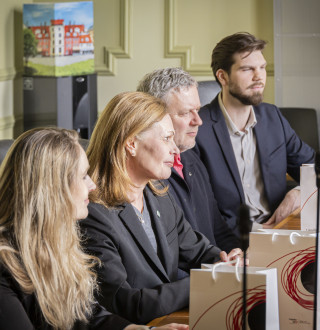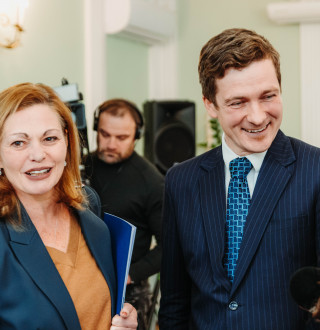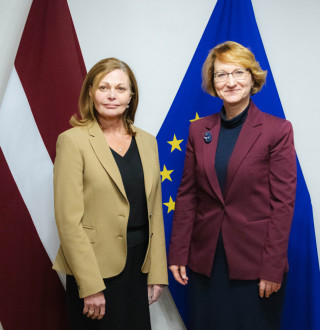On October 16, as part of the annual Nordic Days, Daugavpils Theatre premiered the play “Kaids nūteikti atīs” (“Someone is Going to Come”), directed by Oļegs Šapošņikovs. Among the attendees were Ine Måreng, Ambassador to Norway, and Siri Løkholm Ramberg, representative of Det Norske Teatret and the International Fosse Festival.
Initiated by Stefan Eriksson, Director of the Nordic Council of Ministers Office in Latvia, this production has been celebrated both by the local audience and the guests from Norway – homeland of the author, Nobel laureate Jon Fosse. In the rendition by Šapošņikovs, the play boldly enriches the theatre’s repertoire in Latgalian, complementing the programme up to now dominated by light comedy and plays for children. This time, it’s a philosophical thriller. Moreover, this staging marks a bold new direction, marking new professional heights for the director Oļegs Šapošņikovs.
The story centers on a couple who have purchased an old, remote house by the sea, visiting it for the first time, intending it as a secluded haven. Besides capturing inner conflicts and unresolved scars of the past, it portrays a wide range of emotions, with jealousy taking the lead. Verbal, auditory and visual elements build tension and suspense. The play makes you feel the need to count how often the phrases “alone together, alone within each other” and “someone is going to come” are repeated during the course of one and the half hours. Even the ones who take on the task of counting lose track due to being unnoticeably drawn into the swirl of the story. Repetitions create a pulse, skillfully heightening suspense and holding the audience on the edge of their seats.
Laconic dialogues may give the impression that not much is happening on the stage, yet Šapošņikovs has turned this simplicity into a multi-layered experience for spectators, impersonating a vivid empathy that distinguishes this adaptation from previous productions. Dance, music and graphic design elements all stand as values on their own while deepening the collective impact of the story.
Fosse writes in New Norwegian (Nynorsk), a language comparable to Latgalian in terms of the number of local users. Slightly awkward humour and dramatic pauses are characteristic distinction for his work. Just like straightforward language and direct textual approach, omitting standard punctuation and relying solely on line breaks. This unusual approach provides ample airfield for director’s creative expression.
“When I started work on the play, I was captivated by the text’s magic,” says director Oļegs Šapošņikovs. “Fosse’s plays are unique – it’s neither ordinary prose nor poetry. His text works almost like an incantation, leading the audience into a special world of emotions, with the content itself rich in symbolism. Among multiple possible interpretations of Fosse’s work, our adaptation links these symbols with theories from Sigmund Freud and Carl Gustav Jung. As I see it, this play reveals much about Fosse’s views on the complex workings of the human psyche and the parts of it hidden from our consciousness.
The play is much more than the relationship between a man and a woman. The significance of what is said, unsaid or shouted in silence prompts spectators to reflect on their own inner world and the way we interact with others. It also stirs up possibly hidden or forgotten fears of the unknown and inevitable changes. Yet, every viewer is invited to find their own meanings and arrive at personal reflections, making the play by Fosse a special experience for everyone in a slightly different way.”
Fosse’s first play “Someone is Going to Come” (title in the original language – “Nokon kjem til å kome”) was written in 1992 and staged for the first time in 1996 in Norway, and afterwards in Paris in 1999. It remains his most frequently performed work by Fosse. With more than seventy novels, poems, children’s books, essays and plays translated into over fifty languages, Fosse is Norway’s most performed playwright after Henrik Ibsen and one of the world’s most staged contemporary dramatists. His minimalist and introspective plays in the form of lyrical prose or poetry are considered a modern continuation of the dramatic tradition established by Henrik Ibsen in the 19th century. Fosse’s work displays postmodernist and avant-garde features – minimalism, lyricism and unconventional syntax. In 2023, he was awarded the Nobel Prize in Literature “for his innovative plays and prose which give voice to the unsayable.”
The premiere of “Someone is Going to Come” was part of the cultural programme at the annual Nordic Days. Nordic Days are held every year in a different regional city of Latvia and organized by the Nordic embassies and the Nordic Council of Ministers’ Office in Latvia. The play was supported by the Norwegian Embassy in Latvia, the Nordic Council of Ministers Office in Latvia and House of Languages. The production is licensed by the Colombine Teaterförlag.
Next show: December 13. Tickets available at Biļešu Paradīze: https://www.bilesuparadize.lv/lv/event/145728
Director: Oļegs Šapošņikovs
Translator: Jūlija Tumanovska
Choreographer: Irina Bogeruka
Composers: Jēkabs Nīmanis, Marks Šelutko
Stage Design: Inga Bermaka, Anna Meldrāja, Sergejs Vasiļjevs, Gatis Timofejevs
Cast: Zanda Mankopa, Līga Ivanova, Marks Šelutko, Māris Korsiets, Ritvars Gailums, Egils Viļumovs, Miroslavs Blakunovs, Vanda Gibovska, Jevgeņijs Mihailovs
Photos: Džeina Saulīte, Daugavpils Theatre archive
Media articles on the play: LSM.lv, RUS.LSM.lv, Chayka.lv











